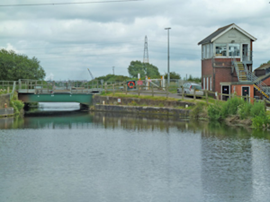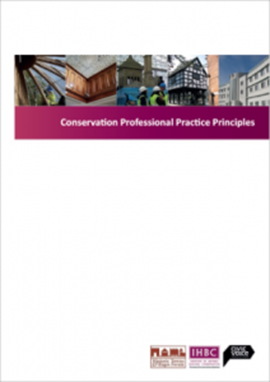Planning authority duty to provide specialist conservation advice
This article was created by The Institute of Historic Building Conservation (IHBC). It was written by Seán O'Reilly BA, PhD, MURP, FInstLM, FSA Scot, IHBC, Director of the Institute of Historic Building Conservation. It was published in October 2014. You can see the original article on the IHBC website.
Contents |
Summary
Local planning authorities have substantial statutory and non-statutory duties to provide specialist conservation advice, especially in delivering sustainable development and growth. This IHBC Guidance Note addresses key duties, threats, opportunities and solutions.
Duties in law and policy
Local planning authorities (LPAs) play the central and vital role in conserving England's heritage. Through planning, LPAs have statutory responsibility for decisions on how places change and how local heritage resources are conserved and developed. [1]
To deliver on an LPA's statutory duties, legislation also confirms that they need properly informed input of specialist conservation advice and judgement. For example the Planning (Listed Buildings and Conservation Areas) Act 1990 empowers the Secretary of State to approve 'the arrangements which the authority propose to make to obtain specialist advice in connection with their functions…'.
To deliver on an LPA's statutory duties, legislation also confirms that they need the properly informed input of specialist conservation advice and judgement. For example, the Planning (Listed Buildings and Conservation Areas) Act 1990 empowers the Secretary of State to approve 'the arrangements which the authority propose to make to obtain specialist advice in connection with their functions…'. [2]
England's National Planning Policy Framework (NPPF) also confirms the importance of appropriate and targeted specialist input as part of the LPA's duties to conservation across the entire built and historic environment. Through the NPPF planning authorities have specific corporate duties to make informed planning decisions on how 'special interest' (NPPF 127) and 'significance' (NPPF 17; 126 etc.) are managed as all of their places develop, following the statutory duties cited above.
With a 'Core Planning' principle of the NPPF being to: 'conserve heritage assets in a manner appropriate to their significance' (NPPF 17), it also highlights areas where specific conservation skills are essential to informed decisions. These include determining proportionality in heritage values (NPPF 128) and evidence (NPPF 129); assessing 'substantial' harm and mitigation to heritage works (for example, NPPF 132; 133, 134, 141), and character in new design in the historic environment (NPPF 58, 80, 126), among others.
Through Building Regulations specialist conservation advice is needed also to help LPAs meet climate change challenges in traditional buildings [3] and advise on the interpretation of the Secure and Sustainable Buildings Act 2004. [4]
Threats to economic and environmental planning
Statute and policy recognise that if a local authority does not have access to skilled advice at the right level, or its advisory process is not functioning, then decisions cannot be properly informed. This threatens the built and historic environment by putting resources and assets at risk. It also undermines confidence in the competence of the authority. Decisions also are more open to ombudsmen's review and challenge in the courts.[5] The 2010'Penfold review of non-planning consents' highlighted how failings here slowed planning processes, development and growth.[6]
Opportunities
Extensive research confirms that effective conservation services play a positive role in local enhancement and regeneration, generating inward investment, sustainable jobs and growth. [7] Clearly such conservation services are not only a legal and operational duty, but they offer affordable and invaluable ways to underpin local jobs and growth.
Solutions
The best way for LPAs to address statutory and corporate duties to conservation is to have an appropriate level of informed professional conservation advice accessible across its planning service. A simple way to demonstrate a commitment to those duties is to employ suitably qualified conservation specialists such as Conservation Officers. Penfold particularly recommended the skills sets of IHBC members. [8]
Recommendation on publicising conservation resources
The IHBC strongly encourages all planning authorities to specify how they are addressing their statutory and corporate duties to conservation. A prominent and accessible description of the resources allocated and processes adopted may be a simple and economic service improvement. Such practice also aligns with the recommendations of Penfold. [9]
This is one of a series of occasional Guidance Notes published by The Institute of Historic Building Conservation (IHBC). The Notes necessarily reflect knowledge and practice at the time they were developed, while the IHBC always welcomes new case examples, feedback and comment to mailto:research@ihbc.org.uk for future revisions and updates.
--Institute of Historic Building Conservation 09:54, 16 Jun 2016 (BST)
Notes
- [1] Planning (Listed Buildings and Conservation Areas) Act 1990 C9, for example S.16(2) and S.71(1).
- [2] Ibid., Sch. 4, para. 7.
- [3] Building Regulations Parts L1B and L2B 2010 para. 3.13; DECC's Green Deal Provider Code of Practice version 3, 2013, Annex B para. 44.
- [4] Clause 2 (1) states “In making building regulations the Secretary of State shall have regard, in particular, to the desirability of preserving the character of protected buildings that are of special historical or architectural interest” and identification of the relevant heritage assets and interpretation and application at local level requires specialist conservation advice.
- [5] Consequences are outlined at www.ihbc.org.uk/skills/england/
- [6] See www.bis.gov.uk/penfold.
- [7] See www.ihbc.org.uk/skills/england/, Appendix 3 & www.ihbc.org.uk/skills/page7/
- [8] Penfold, 2.46.
- [9] Penfold, Annex D: 'Framework for 'Quality Development Code', for example.
Related articles on Designing Buildings
- Archaeology and construction.
- Building Preservation Notice.
- Cautions or formal warnings in relation to potential listed building offences in England and Wales.
- Charging for Listed Building Consent pre-application advice.
- Conservation area.
- Conservation officers in historic towns.
- Conservation practice survey 2016.
- Designated areas.
- Enterprise and Regulatory Reform Act 2013 and listed buildings.
- Forced entry to listed buildings.
- Heritage partnership agreement.
- How to make conservation areas work.
- IHBC and ALGAO sign Memorandum of Understanding.
- IHBC responds to Review of the Mission and Pastoral Measure 2011.
- Impact of heritage sector local authority funding cuts in south west England.
- Implementing the Heritage Protection Reforms.
- Institute of Historic Building Conservation.
- Listed Building Heritage Partnership Agreements.
- Local Authority Conservation Staffing Resources in England 2020.
- Local Listed Building Consent Orders.
- Listed building.
- Listed Building Consent Order.
- Loss of senior conservation staff and posts in England March 2010 to April 2011.
- Misericord.
- Mission and Pastoral Measure 2011.
- Negotiating skills for conservation professionals.
- Pre-application advice for planning permission.
- Scheduled monuments.
- Sharing local authority conservation services.
- Use of direct action in heritage enforcement cases in England.
IHBC NewsBlog
Heritage Building Retrofit Toolkit developed by City of London and Purcell
The toolkit is designed to provide clear and actionable guidance for owners, occupiers and caretakers of historic and listed buildings.
70 countries sign Declaration de Chaillot at Buildings & Climate Global Forum
The declaration is a foundational document enabling progress towards a ‘rapid, fair, and effective transition of the buildings sector’
Bookings open for IHBC Annual School 12-15 June 2024
Theme: Place and Building Care - Finance, Policy and People in Conservation Practice
Rare Sliding Canal Bridge in the UK gets a Major Update
A moveable rail bridge over the Stainforth and Keadby Canal in the Midlands in England has been completely overhauled.
'Restoration and Renewal: Developing the strategic case' Published
The House of Commons Library has published the research briefing, outlining the different options for the Palace of Westminster.
Brum’s Broad Street skyscraper plans approved with unusual rule for residents
A report by a council officer says that the development would provide for a mix of accommodation in a ‘high quality, secure environment...
English Housing Survey 2022 to 2023
Initial findings from the English Housing Survey 2022 to 2023 have been published.
Audit Wales research report: Sustainable development?
A new report from Audit Wales examines how Welsh Councils are supporting repurposing and regeneration of vacant properties and brownfield sites.
New Guidance Launched on ‘Understanding Special Historic Interest in Listing’
Historic England (HE) has published this guidance to help people better understand special historic interest, one of the two main criteria used to decide whether a building can be listed or not.
"Conservation Professional Practice Principles" to be updated by IHBC, HTVF, CV
IHBC, HTVF, and CV look to renew this cross-sector statement on practice principles for specialists working in built and historic environment conservation roles.


















Comments
The NPPF paragraphs have not been updated with the NPPF 2019 and so do not make sense with the text.